Halal Certificate
A halal certificate is a recognition given to business entities that have complied with the halal guidelines set out in Manual Prosedur Pensijilan Halal Malaysia, MPPHM (Domestic) 2020 and Malaysia Halal Management System, MHMS 2020. A halal certificate entitles a company to use a halal logo that will distinguish between halal-guaranteed and non-guaranteed halal products.
Malaysian Halal certificate is an initiative by the Malaysian government which is a country with a majority Muslim population in protecting Muslim consumers from using illegal products.
The Quran explains that only a few sources are haram and generally we know more halal food than haram so why bother to develop a halal system?
This is because, many of the products available in the market actually use products from non -halal sources.
With the development of food technology, vigorous exports-imports, easy access to raw materials abroad- all this further increases the risk of dumping of non-halal products in the Malaysian market.
To achieve this mission, a mechanism needs to be developed to separate halal and non-halal products with a labeling system. That is what Halal Certification JAKIM Malaysia comes into play.
With the Halal Logo labeling system, Muslim consumers can distinguish between illegal and halal products.
What is Halal Certificate?
Before we dive into the topic of how to apply halal certificate, it is better that we first understand the concept or basis of halal itself so that we are clear with the requirements and conditions of halal certification.
Halal is an Arabic word that simply means “permissible” or “lawful”. The word itself means that what Muslims are allowed do to in their lives, especially when it comes to food and drink. The opposite of Halal is Haram which again is an Arabic word for something that’s forbidden.
The differentiation of halal and haram is set out by the Holy Quran and is reflected in the Sharia law which governs the Muslim way of life.
Like everything else in the Muslim law, what’s Halal and Haram is also sourced from the Holy Quran, Sharia Laws, as well as the Hadith which is the traditions of the Prophet Muhammed.
The term halal is most often associated with Islamic dietary laws, especially meat. It is a must for A Muslims to be sure about how the meat they are consuming is sourced, processed, and prepared to be edible for them. Besides that, the Islamic jurisprudence clearly specifies which foods are Halal and which are Haram.
So, what does this means by Halal meat?
To make meat status halal, it must be slaughtered in a way known as dhabiha. This means cutting the carotid arteries, carotid arteries and trachea to drain all the blood from the cadaver. In Islam, consumption of blood is considered a haram. During this process, Muslims must recite offerings called Tasmiya or Shahada.
Carrion – an animal that has died from disease or natural causes – is also considered Haram. An animal must be alive, healthy and conscious at the time of slaughter for its meat to be considered halal.
In short, a halal certificate is an identity to a product that states the halal status or not of a product or service. Just like kosher for Jews, where the kosher certificate on the product indicates that it can be used by Jews.
It also applies to GMO, Vegetarian status and the list goes on
Who can issue halal certificate?
Prior to 2000, anyone could issue a halal recognition certificate as there were no halal-related guidelines and laws.
JAKIM’s Halal Hub Division, Halal State Religious Department and even many private companies issue halal certification according to their own standards.
There is no uniformity in terms of standards, reviews, monitoring and documentation. A few known companies make millions of dollars every year back in the 90’s just by selling halal certificates without properly performing halal status checks.
This matter is very worrying because it not only persecutes business owners who are deceived by this private company, but also confuses consumers who believe that the products purchased are halal while the review that really follows the halal guidelines is not implemented.
In 2004, the Malaysian halal certification manual was introduced and in 2011, the Trade Act 2011 (KPDNKK) was created which means that no one can issue halal certification in Malaysia except JAKIM. This also means that only 1 halal logo is recognized and used for Malaysian products.
After that, there will be no more private companies selling halal certificates. but off course there will be a handful of individuals who will seek to exhibit halal status without going through a valid halal certification process by JAKIM.
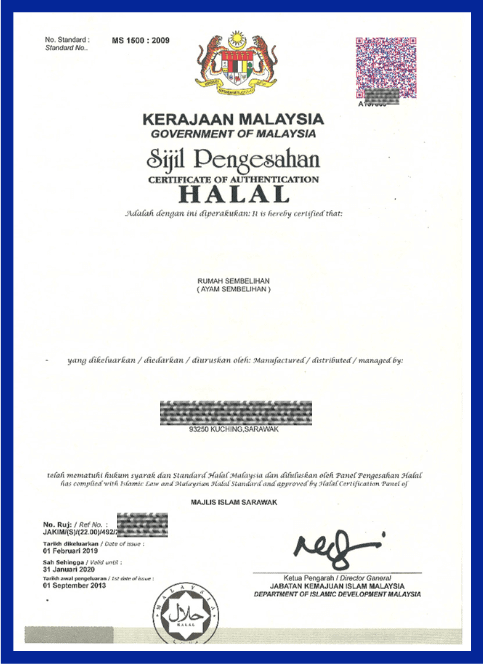
But this is in Malaysia. What about in other countries?
Well currently it is just like in Malaysia in the 90’s. To implement what Malaysia is doing now in foreign countries is impossible because the Muslim population in foreign countries is a minority.
Malaysia is an Islamic country. Malaysia is the only country that places halal certification under the responsibility of the government which is regulated by JAKIM.
In other countries, many private companies and NGOs still issue halal certificates.
However, Malaysia as a leader in halal certification has taken the initiative to recognize foreign halal certification bodies if their certification process is in accordance with syara’ and food safety standards.
To date, there are a total of 84 foreign halal certification bodies recognized by JAKIM from 45 countries.
How many schemes are available for halal certificate application?
Malaysian’s JAKIM Halal certification was initially introduced to offer only 2 halal certification schemes, namely the food product scheme and the food premise scheme.
This means it is only open to businesses such as restaurants, cafes, hospital kitchens, canteens, hotel kitchens and food and beverage product manufacturers.
Based on industry demand and also taking into account halal rational factors, JAKIM from time to time introduces new schemes.
Currently, JAKIM offers 10 halal certification schemes by industry category and the most recent is the medical device halal certification scheme.
The following are the halal certification schemes that can be applied for based on MPPHM (Domestic) 2020:
- Food Premises Scheme
- Food Product Scheme
- Used goods product scheme
- Pharmaceutical product scheme
- Cosmetic product scheme
- Slaughterhouse Scheme
- Logistics service scheme
- Contract / OEM manufacturing scheme
- Medical device product scheme
- Veterinary Certification Scheme
What is Halal Training refers to?
Halal Certification JAKIM Malaysia is a standard. Standards mean that they include the conditions, guidelines and processes that allow an organization to be recognized.
Here is the importance of training. For a company to be recognized as halal, people who are in the organization or are known as employees must understand the concept of halal itself.
The food industry is also a place to learn. Not all workers are employed as professionals. Some start out as SPM holder or even PMR level employees curious about the hospitality industry.
Non -Muslim workers also do not know about halal, even Muslim workers themselves only know the basics of halal according to syara’ but do not know about the Malaysian halal certification scheme.
Halal knowledge can be acquired and improved over time. In fact, some food companies and food establishments offer training programs for those who are interested.
Perhaps one of the most important training programs a worker can undertake is Halal Awareness Training that covers the basic principle of halal and its implementation.
In order to increase the knowledge of people across the food industry on halal, several initiatives have been launched to develop Halal training programs. These programs are implemented by Halal personnel and food safety experts with extensive knowledge of the ins and outs of halal programs. They are available everywhere and can even be accessed from the comfort of your home or office.
In MPPHM (Domestic) 2020, only 4 of these trainings are stated and must be attended by employees for organizations that have obtained halal certification or who want to obtain halal certification
- Halal Awareness Training
- Halal Competency Training
- Halal Executive Training (Competency)
- Halal Internal Audit Training (Competency)
Although only 2 of these trainings are mentioned, but in the industry there are other halal-related courses that exist at the request of the industry itself, namely:
1) Halal Assurance System Course
2) Halal Internal Audit Course
There are also other training programs related to halal and food safety and this depends on the specific needs of the company for an example:
1) Food Handling Course also known as Kursus Pengendalian Makanan
2) GMP Awareness Training
3) HACCP Awareness Training
4) Food Allergen Training Course
5) Food fraud Training Course
6) Food defense Training Course
7) ISO: 22000 Training Program
These training programs need to be attended regularly depending on the size of the organization and also the type of certification they have.
Why halal training is important?
The purpose of halal training is to ensure that employees really know how to handle food products with halal and safe guidelines in order to ensure that the products that reach consumers are safe and halal to be consume by Muslim consumers in particular.
If employees are not trained with halal training or the company management fails to develop a training plan for employees, it is feared that employees will commit errors during the handling of food products that will cause contamination of non -halal materials in the products produced.
This will result in a violation of the conditions and guidelines of JAKIM Malaysia’s halal certification scheme which will result in non -compliance and reasons for the suspension of the halal certificate or the withdrawal of the halal certificate.
What is halal awareness training?
Halal awareness training is a training program that must be attended by all employees in the food processing division, especially for companies that have halal recognition or for companies that want to apply for JAKIM Malaysia halal certification.
Based on the MPPHM (Domestic) 2020 clause [Part IV (12)]:
(a) Halal awareness training for new employees shall be implemented within three (3) months from the date of appointment;
(b) Halal awareness training shall be conducted at least once every three (3) years to all employees involved in processing and/ or service activities;
(c) Halal awareness training shall cover the scope related to halal concepts and Malaysian Halal Certification procedures, and be conducted by organizations or individuals registered under HPB JAKIM;
(d) Halal awareness training may be extended to relevant third parties such as brand owners, suppliers, transport providers and others as deemed necessary;
View our Halal Awareness Training Online schedule for 2022.
What is Halal Competency Training?
Halal Competency Training is a new type of training introduced in MPPHM 2020 that is not available in the previous manual MPPHM 2014. It is a training program dedicated to Internal Halal Committee (IHC) Members.
This means, for micro and small status companies that do not require IHC development, they do not need to attend this training.
Based on the MPPHM (Domestic) 2020 clause [Part IV (12)]:
(e) Halal competency training shall be conducted at least once every three (3) years to all members of the Internal Halal Committee formally appointed by the top management of the company;
(f) Halal competency training shall be conducted by a Halal Training Provider registered under HPB JAKIM or a competent authority that covers the following scope:
- Understanding of Shariah and fatwas;
- Malaysian Standard (MS);
- Malaysian Halal Certification Procedure Manual;
- Malaysian Halal Management System (MHMS);
- Legislation related to halal; and
- Critical ingredients (if applicable).
(g) The management of the company shall provide adequate financial funds and infrastructure for the purpose of conducting training; and
(h) Records of halal awareness training and competency training shall be well kept, updated and easy to refer to during the auditing or monitoring of Malaysian Halal Certification.
View our Halal Competency Training Online schedule for 2022.
What is halal inspection / audit?
The integrity of the halal program is monitored and measured through consistent periodic inspections and audits. This is the core and pillar of the process and ensures strict adherence to the agreed criteria, conditions and requirements for granting certification.
Through methodical investigation, theory is measured and aligned with practice, which ensures confirmation from JAKIM Halal Board Committee that products and facilities are indeed halal.
JAKIM’s inspection team travels hundreds of miles to inspect every aspect to ensure compliance with halal standards. Inspectors are constantly digging and researching, reviewing documents, recommending and issuing compliance notices, and more, without fear or favoritism.
The inspection / audit process will be carried out by the Inspecting Officer who is a competent individual and appointed by the competent authority to carry out the process of auditing or monitoring the Malaysian Halal Certification.
There are 3 types of halal audit inspection
Adequacy audit
Means the adequacy audit of conditions and documents declared by the applicant for halal certification for new applications and renewals.
Field audit
Field audit is an audit conducted by an audit officer from JAKIM/JAIN at the premises of the halal certification applicant. The audit process carried out includes
- Opening meeting;
- Document review;
- Field inspection;
- Preparation of reports; and
- Closing meeting.
Follow-up audit
Means periodic audit inspection of a company that has obtained halal recognition to confirm that the company has not violated any halal conditions and guidelines during the period of holding the halal certificate.
The scope of control and audit inspection requirements mainly includes the following items:
1. Documentation that includes:
- Halal application file;
- MHMS files;
- Copy of the company’s halal certificate (if applicable);
- Employee records;
- Halal training records;
- Records of purchase of raw materials;
- Pest control records;
- Product processing records;
- Previous Malaysian Halal Certification audit or monitoring records; and
- Other documents and records related to the requirements of Malaysian Halal Certificate.
2. The content of raw material, processed material or additives must be halal.
3. Records of halal awareness training and competency training are consulted during the auditing or monitoring of Malaysian Halal Certification.
4. Processing, administration and distribution of products.
5. Roaster cleaning should be well planned and free of contamination.
6. Equipment, apparatus, machinery and aids for food processing must be clean, tidy and safe during production.
7. All halal products must be stored separately from non-halal material and below the required suitable temperature.
8. Hygiene, sanitation and food safety.
9. HACCP and GMP must be fully implemented.
10. Packaging and labeling. All materials should not be made of materials categorized as Najs / dirty or hazardous to health. The packaging and label must be clearly legible with the product name, the name and address of the manufacturer / distributor brand, the list of ingredients, the numerical code, the batch number and the expiry date and the JAKIM Halal logo.
What are the requirements for halal certification?
Requirements for Halal Certification JAKIM Malaysia is as follows:
(1) Raw Materials
- Every raw material must be halal, safe and uncontaminated;
- Raw materials sourced from animals and/ or based on animal products shall be certified halal which is still valid from a competent authority or a recognized halal certification body;
- Raw materials derived from animals and/ or based on imported animal products (such as beef, poultry, gelatin, etc.) shall be obtained from slaughterhouses or processing plants approved by JPV;
- Raw materials that are not certified halal or certified halal by a certification body not recognized by JAKIM must have complete supporting documents (containing the composition of materials, flow chart and source of raw materials);
- Each raw material shall be able to identify the original producer of the raw material;
- Raw materials that have undergone additional processing (such as cutting, pre -mixing, repackaging) by third parties including suppliers or intermediaries must have a valid halal certification;
- All raw materials must be declared in the MYe-HALAL application form in the same detail as the label on the raw material;
- The raw material shall have a clear, bright, intelligible label with the name and manufacturer of the raw material;
- The raw materials used shall comply with the requirements of applicable laws and regulations; and
- An analysis report for the determination of water quality shall be submitted if the water source is obtained other than the Water Supply Department (if applicable).
(2) Products, Menus and Services
- The product produced must not resemble any form of animal that is categorized as najs mughallazah, religious in nature and has negative implications for Malaysian Halal Certification;
- All products or menus that are still produced must be applied for;
- The name of the product or menu declared in the MYe-HALAL application form shall be the same as the product label or menu display;
- The products, menus and services requested by SPHM must be produced or operated consistently and have updated processing and/ or handling records;
- Products, menus and services may be dropped from the application list if they have not been processed or there has been no service operation during the previous validity period;
- The dosage and weight of the product shall meet the content or quantity rate as stated on the product label;
- Products, menus and services processed or operated shall comply with the requirements of applicable laws and regulations; and
- Products or menus that are still in the research and development (R&D) stage but are ready for commercialization must meet the following criteria:
✔️ Raw materials are available and can be reviewed during the audit or monitoring of Malaysian Halal Certification;
✔️ No changes to raw materials or ingredients and labeling;
✔️ A trial run or pilot run has been conducted on the production line; and
✔️ Approved by the management of the company.
(3) Processing
- All activities related to the preparation and processing of raw materials, products, menus or services shall meet the requirements of shara’, laws and regulations in force;
- The processing area shall be free from any raw materials or products that are not halal or of doubtful halal status;
- The processing area shall not be used for purposes other than the processing and handling of halal -certified products unless halal control mechanisms are implemented;
- The processing area shall be free from any product production activities for religious purposes that have negative implications for Malaysian Halal Certification such as the production of prayer oil;
- Processing and handling shall meet the requirements of good hygiene practices such as GHP and/ or good manufacturing practices such as GMP;
- The processing area shall be in a clean and orderly condition at all times; and
- Toxic or hazardous chemicals, detergents, equipment and unrelated items shall not be placed or stored with raw materials and products in uncontrolled processing areas.
(4) Storage
- Storage shall be reserved for raw materials and halal products only including trading products;
- Storage of raw materials, finished products, R&D materials or products, reject items and other materials such as equipment and non-food chemicals shall be segregated and labeled;
- Equipment, materials and products not related to the processing or production of products shall not be stored together with raw materials and finished products;
- All materials and products shall be stored in accordance with the requirements of the nature of the product;
- The storage area shall be in a clean and orderly condition at all times;
- The storage area shall have complete procedures and records and have clear markings;
- All materials and products shall be properly arranged and regulated to facilitate cleaning activities. The use of bases such as pallets should be appropriate;
- A written contract or agreement or mutual agreement shall be obtained if the storage is managed by a third party. Priority should be given to warehousing service providers that have Halal certificate;
- Any storage activity of raw materials or products shall comply with the requirements of laws and regulations in force; and
- The sertu process shall be carried out if the storage area is contaminated with Najs Mughallazah.
(5) Equipment and Hardware
- Equipment and hardware shall be used for the processing and handling of halal raw materials, products and services only;
- Equipment and utensils that may have negative implications on Malaysian Halal Certification such as the use of equipment and utensils labeled alcohol products shall not be used;
- Equipment and utensils from animal sources shall not be used except those identified as halal status such as water filters, bristles, crockery and others;
- Equipment and appliances shall always be in good condition, clean, free from feces, free from any harmful substances (such as toxic and rust) and not have negative side effects on the product and the operator;
- Equipment and utensils shall have regular and scheduled cleaning and maintenance procedures so that they are always in good condition especially weighing and measuring instruments;
- Damaged or unused equipment and hardware shall be identified, removed or segregated;
- The equipment and hardware used shall be appropriate and comply with the requirements of applicable laws and regulations; and
- The sertu process shall be carried out if the equipment and utensils are contaminated with Najs Mughallazah.
(6) Packaging, Labeling and Advertising
- Packaging and labeling materials must be halal, do not contaminate the product and safe for human consumption;
- Packaging, labeling and advertising shall not violate the principles of Syara’, not highlight elements of immorality that are morally contrary and have negative implications for Malaysian Halal Certification;
- The labeling and advertising of products and services shall not use statements, symbols, terms or names that have religious and divine elements such as the names of Allah, sunnah food, gods and the like;
- Any form of diagram or illustration of an animal that is categorized as najs mughallazah, religious in nature and has negative implications for Malaysian Halal Certification shall not be used;
- Product labeling shall be the same as the product name declared in the MYe-HALAL application form;
- Packaging labels shall be printed clearly and distinctly and not easily erased;
- Any claim on the product label shall comply with the laws and regulations enforced by the relevant authorities;
- Packaging, labeling and advertising shall comply with the standards, laws and regulations enforced by the relevant authorities;
- The labeling of products processed and packaged in the country shall use the Malay language and may include its translation in any other language; and
(7) Transportation and Distribution
- Transportation and distribution shall be for the use of halal raw materials and products only;
- Appropriate transportation shall be used according to the requirements of the nature of the product;
- Transport shall be kept in a clean and controlled condition at all times;
- A written contract or agreement or mutual agreement shall be obtained if transportation and distribution are arranged by a third party. Priority should be given to transportation service providers who have valid Halal Certificate;
- Any activity of transportation and distribution of raw materials or products shall comply with the requirements of laws and regulations in force; and
- The sertu process shall be carried out if the transport is contaminated with Najs Mughallazah.
(8) Premises
- Shall comply with GMP guidelines which cover aspects of cleanliness, layout and passage of good and effective workers and goods.
- Premises must also be in a suitable location for halal food processing. Premises must obtain a license from the Local Authority.
(9) Employees
- The number of Muslim employees shall be sufficient according to the requirements of the application category;
- Personal hygiene must always be at a good level;
- Employees’ attire shall be clean, polite and appropriate;
- Personal belongings, food and beverages of employees shall not be brought into the processing area;
- Personal protective equipment appropriate to the requirements of the job such as headgear, gloves, face shield, safety glasses and others shall be provided to each employee;
- Employees shall not commit any acts, conduct and actions that may cause contamination of substances and products such as smoking or spitting;
- The appointment and recruitment of employees shall comply with the requirements of laws and regulations in force; and
- Shall adopt the employee code of ethics and Good Hygiene Practices (GHP) as prescribed under the regulations of the relevant authorities.
(10) Sanitation
- Cleaning in the processing area shall be done on a scheduled basis;
- The environment of the premises shall be clean and free from factors that can contaminate the premises;
- Pest control shall be carried out periodically using external or internal contractors and shall be recorded;
- Hand washing facilities shall be provided and function properly and have appropriate sanitary ware such as soap and tissues;
- The bins provided shall be adequate, in good condition and covered. It is recommended to use trash cans of the hands free type (hands free or foot pedal);
- Toilets shall have cleaning procedures, be clean, odorless, undamaged and not open directly to the processing area; and
(11) Facilities and Welfare of Employees
- Rooms or prayer spaces for Muslim employees shall be provided in a reasonable location, have a suitable area and be well maintained;
- Muslim employees shall be given relief and allocated appropriate time to perform obligatory prayers including Friday prayers;
- Rooms or changing rooms for employees shall be provided accordingly;
- Dining or rest areas for employees must be provided accordingly; and
- Employees’ personal belongings storage facilities shall be provided.
(12) Training
- Has attended courses related to food safety and halal such as
- Food Handling Course
- Halal Awareness Training
- Halal Competency Training
(13) Malaysian Halal Management System (MHMS)
- Development, implementation and maintenance of halal controls based on the MHMS 2020 Manual. For Micro and small companies, it is necessary to develop an Internal Halal Control System (IHCS) while for large companies, Halal Assurance Management System must be developed.
(14) Documentation and Records
- Documents and records shall always be well kept, updated and easy to refer to during the audit or monitoring of Malaysian Halal Certification
- New halal applications must have at least three (3) months of documents and records for the purpose of auditing Malaysian Halal Certification. Due to this, only after 3 months of operation (minimum) the company can start the JAKIM halal certification process.
(15) Worship Entity and Elements
- Any entity and elements of worship shall not be in the processing area.
(16) Compliance with Laws and Regulations
- Business operations shall comply to all related laws and regulation by federal, state and local authorities.
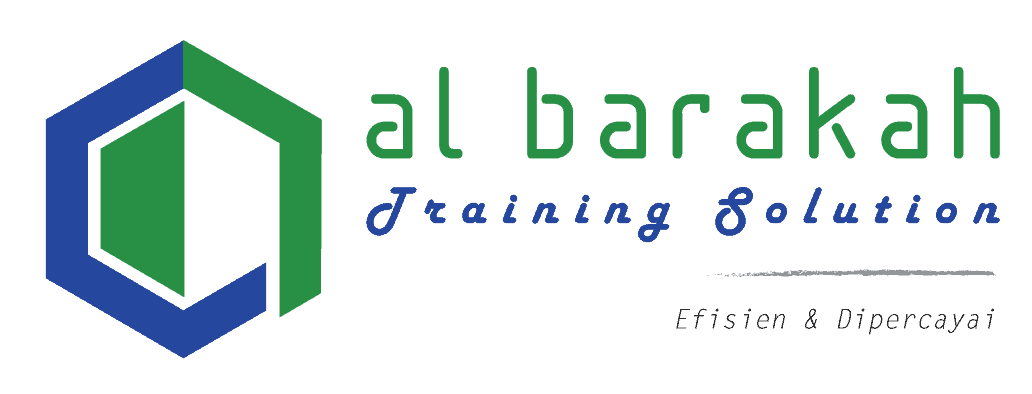
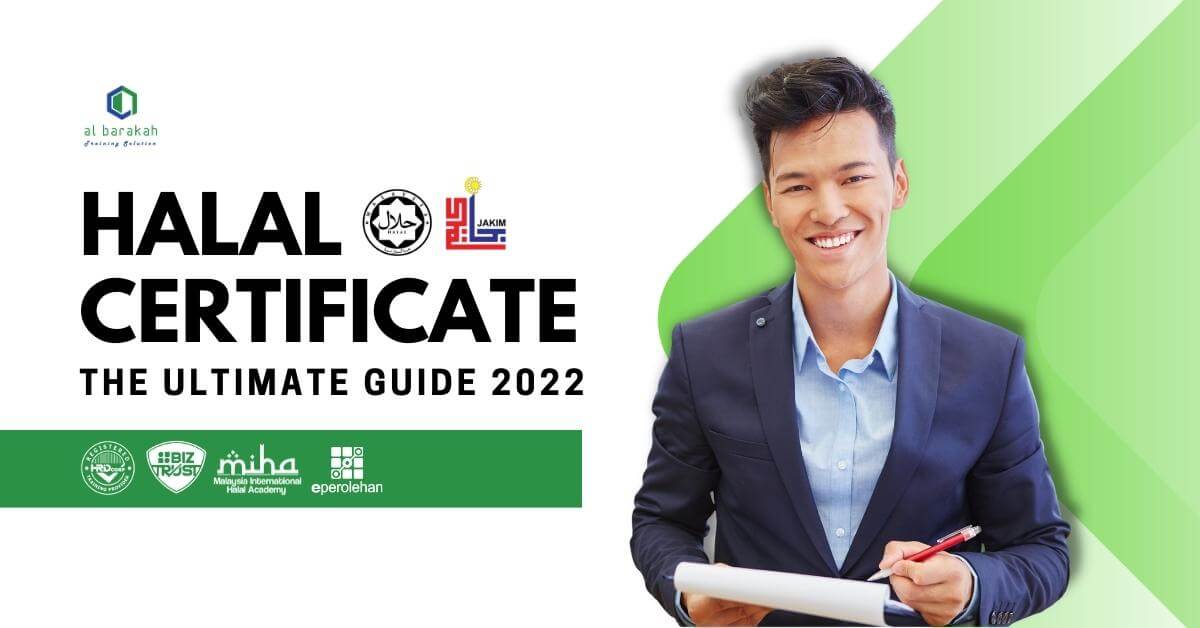
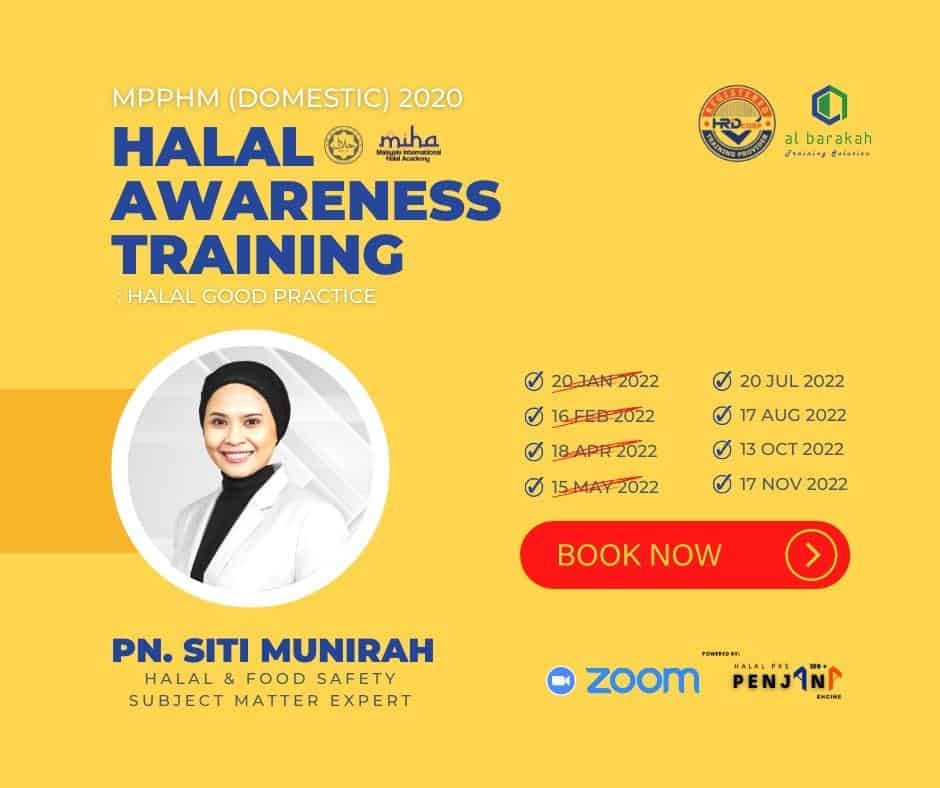

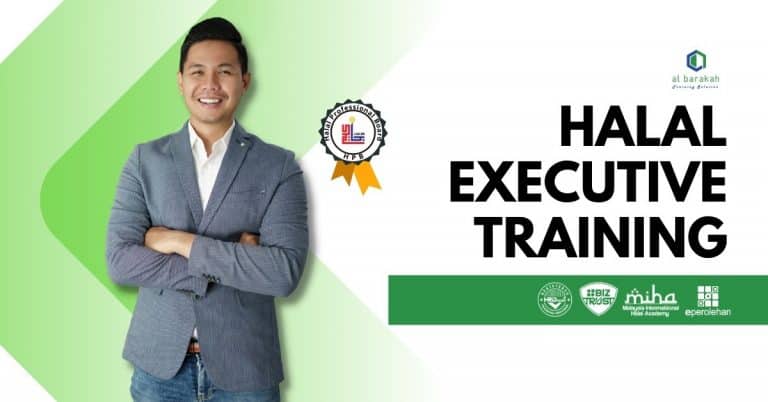


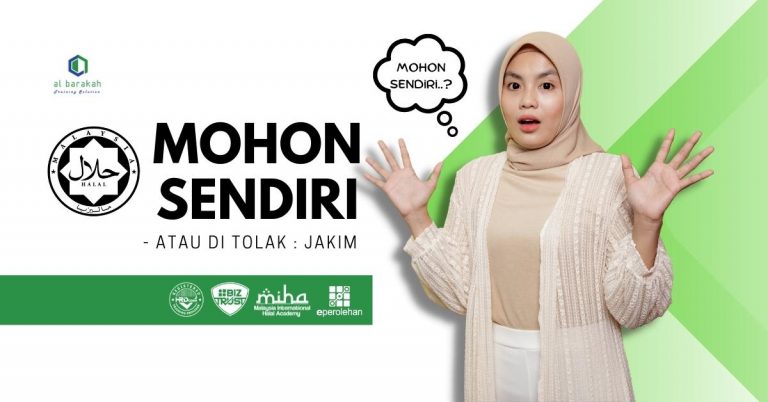
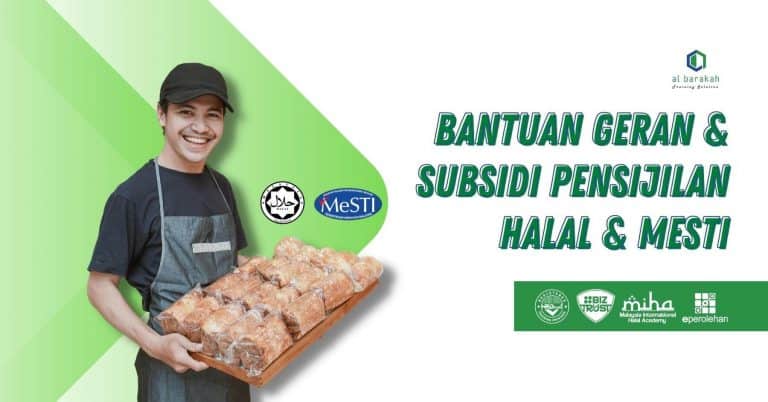

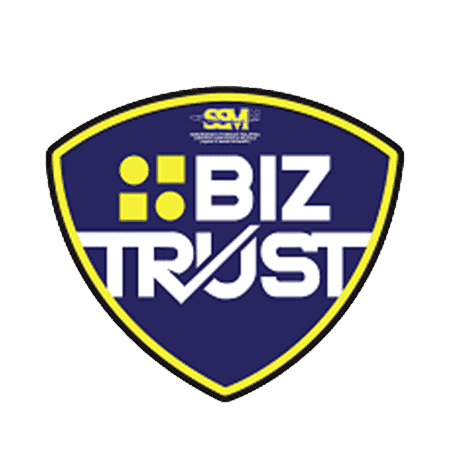
sijil saya hilang
Salam Norakmawati, mohon hubungi koordinator kami 0173284947 untuk cetakan semula sijil.
Terima kasih.
Elaine